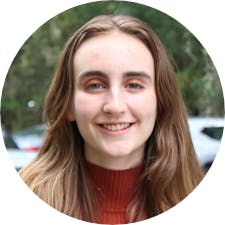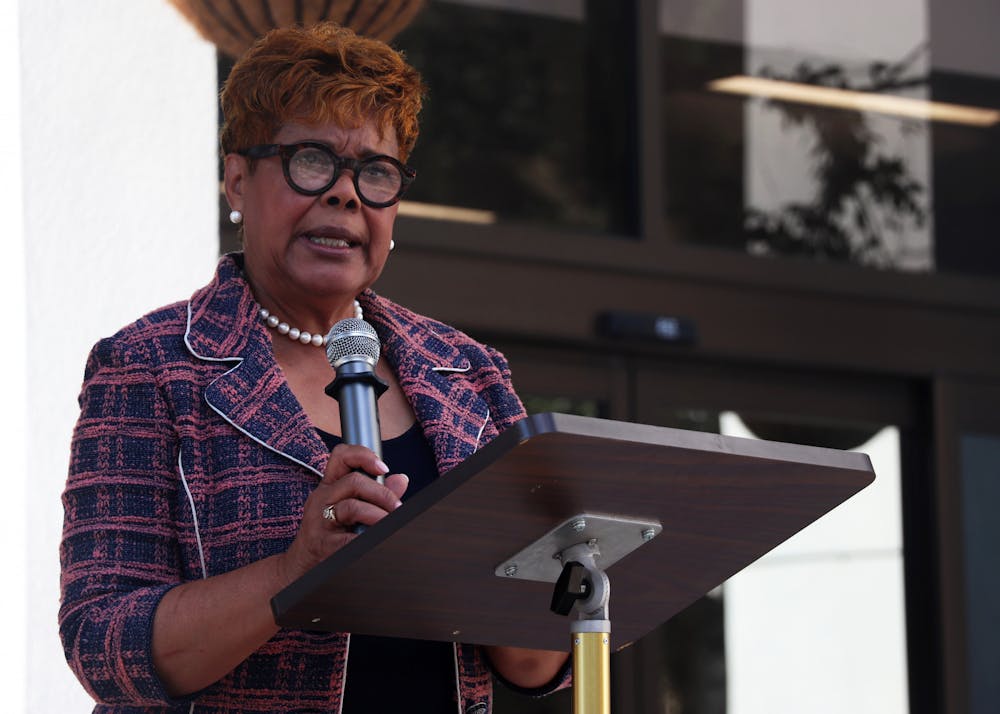Growing up, Cynthia Chestnut didn’t have Black, female role models to look to. So, she became one.
Chestnut, 73, was the first Black woman to serve as a Gainesville City Commissioner, mayor, Alachua County Commissioner and state representative for District 23. She’s now a city commissioner, serving Gainesville for the second time since her tenure in the 1980s.
She recognized each step she took in her political career was uncharted territory, she said.
“I knew that I had to go in and make a difference because so many people depended on me,” Chestnut said. “I assumed the office with a great sense of gratitude and responsibility.”
Chestnut had known she wanted to become a politician since she was a child, she said. She grew up in Tallahassee, receiving her bachelor’s in speech pathology from Florida A&M University and her master’s in speech pathology from Florida State University. She then dedicated her time to getting her doctorate in public administration from Nova Southeastern University.
In Tallahassee, she said, she was able to see the heart of how Florida government functioned, and she knew she wanted to be a part of it.
“You could see the power,” Chestnut said. “You could see the importance of having a seat and realize the difference you could make and I wanted to be a part of that.”
Her aspirations were local from the beginning, she said. At first, she wanted to be mayor of Tallahassee.
But she moved to Gainesville with a boyfriend who was pursuing a UF law degree. Although the relationship that brought her here didn’t last, she met her husband Charles Chestnut while they hosted a WUFT program called “Color Us Black.”
Her desire to serve the community around her had been present since she was a child, growing up as the eldest girl in a household made up of 10 children. The concept of duty wasn’t unfamiliar — her mother, Janie Moore, would tell her she had the responsibility of upholding the family name.
“I knew that I had to be a role model for my sisters,” she said.
Her mother also instilled in her a deep respect for civic duty, going out of her way to vote in every election possible. Moore was aware of a long history of Black voter suppression.
“She understood that the only route we had was the ballot box,” Chestnut said. “And that you could never take that for granted. Never.”
So, she ran for a commissioner seat in 1987.
From the beginning, Chestnut knew her term would be different for her than for her husband, who had sat on the Alachua County Commission and the Alachua County School Board.
Once, she and her husband met with a group of community leaders who asked about her positions on the environment, single-member districts and economic development. But whenever she would start to answer, the men would turn to her husband and ask what he thought.
The final question was about how she saw herself fitting into an environment where there would be two Black commissioners. Instead of answering, she motioned to Charles.
“I turned to my husband, and I said, ‘Charles, what do you think?’” Chestnut said.
Chestnut would go on to win her race, the first in a series of many victories.
She served for three years as a city commissioner, her third year, she was voted in as mayor-commissioner — an appointed position at the time. She then resigned to run for the open District 23 seat in the Florida House of Representatives in 1990. The step up would have been intimidating, but all she felt was excitement, she said.
“I was such a novice,” she said. “I didn’t know to be overwhelmed.”
Chestnut would serve five terms over the course of a decade, during which term limits were put into place and she was prevented from running again.
As a state representative, Chestnut knew she couldn’t focus on everything at once, she said. Education became her focus.
She served as the chair of the House Committee on Education and helped create the legislation that would eventually become Bright Futures, a scholarship program approximately 93% of incoming UF freshmen participate in.
Chestnut and the other Black representatives at the time also pushed for the House to approve House Bill 591 — a 1994 bill focused on reparations for the survivors of the Rosewood massacre.
Despite majority opposition, their small group went into a House “bubble”: a period of discussion they refused to come out of until the House agreed to vote on the bill. The bill ultimately passed, marking one of very few times any group of Black people in the nation has received reparations for past discrimination.
Rep. Yvonne Hinson, D-Gainesville, said she’s constantly surprised by what Chestnut has accomplished, because she doesn’t talk about it. Chestnut will typically only mention legislation she helped out with if it’s in danger of being overturned now. Hinson didn’t know she helped pass Bright Futures until recently, she said.
“When it comes up, I’m always stunned and amazed at what she was able to do,” Hinson said.
Hinson has known Chestnut since the 70s due to family connections. They’ve both served as city commissioners and state representatives, although never side by side. When the pair sit down to talk, it often takes a bit for Chestnut to ease into casual conversation because of how focused she is on her work, Hinson said.
“We have to give it time to unwind before she actually lets go and becomes Cynthia,” Hinson said. “Cynthia the woman, not Cynthia the businesswoman.”
Once the conversation flows, they have “girl talk”: discussions about church, aging and health. She and Hinson started a book club together called the Opinionated Ladies Book Club. They enjoy their off time together, Hinson said, but Chestnut is always ready to go back to the grindstone.
Chestnut ran for a Florida Senate seat in 2000 but lost by a wide margin in the Democratic primary. Candidate Rod Smith won instead. She returned to politics two years later, sitting on the Alachua County Commission for eight years, during which she was chair, until she was defeated by Susan Baird in 2010. After that, she planned on retiring.
But then she learned Gail Johnson, another Black, female city commissioner, was stepping down.
Including Johnson, there were two Black commissioners at the time, she said. She wanted to make sure it stayed that way. So, she decided to run again and was sworn in Feburary 2022.
As a Black woman in politics, Chestnut has found more can be required of her than her colleagues, she said.
She represents a community that has been historically underrepresented, and because of that, she’s often called to many different culturally Black events across town: church services, social functions, ceremonies, fundraisers. She feels a responsibility to them to show she’s committed to her role as their unofficial spokesperson, she said.
“It is a more intense role,” she said. “But for those of us who are in the role, we’re happy to perform the service.”
Chestnut has also served her community outside of her role as a commissioner. Karl Anderson, 49, has known Chestnut for as long as he can remember. He grew up with his family being a friend of hers, and he’s seen Chestnut give as much as she can to Gainesville’s underserved people, he said.
Chestnut worked at UF Health Shands Hospital as director of Eastside Community Relations and Education Coordination from 1997 to 2011. During that time, she was the first person to suggest Shands reach out to the predominantly Black community east of Main Street through churches, Anderson said.
“She cares about people,” Anderson said. “All people. And she don’t stop until she get a result in most cases.”
Anderson is a founding pastor of Upper Room Ministries, a Gainesville church. He saw her grow the conversation surrounding health disparities by involving historically Black churches, he said. Under her leadership, Shands paired with churches to provide classes on topics ranging from cancer awareness to day-to-day healthy eating habits.
Many churches still host services on every second Sunday of February where churchgoers would wear red to raise awareness about heart health, a tradition started by Chestnut, Anderson said.
“It really speaks loud of her legacy,” he said. “It’s not going anywhere… she’s still saving lives.”
During her return to the Gainesville City Commission, Chestnut has made housing and economic development her two key platforms, she said.
Her primary goal is to see a sports complex built on East Gainesville’s Citizen’s Field during her time as commissioner. She thinks it will bring the boost the east side of the city needs to thrive. She calls it their “field of dreams.”
She sees it as her final project, she said. Once the earth is turned on Citizen’s Field, she’ll know she can retire.
Contact Siena at sduncan@alligator.org. Follow her on twitter @SienaDuncan.

Siena Duncan is the Fall 2024 Editor-in-Chief of the Alligator. She's interned for the Salt Lake Tribune, the Tampa Bay Times and POLITICO. In her spare time, she loves to take walks to see the cows by her apartment and add more to her sketchbook.






